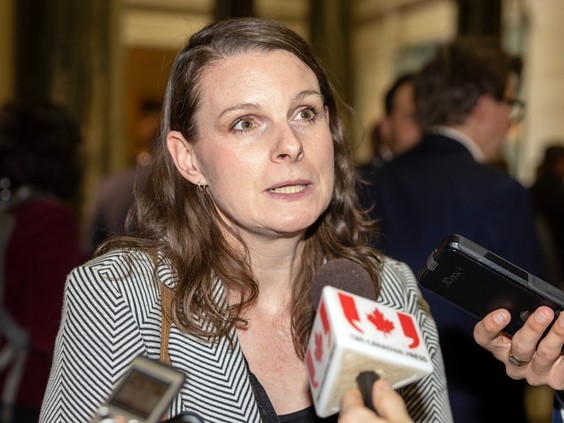
Julia Peterson, Saskatoon StarPhoenix
SSBA president Jaimie Smith-Windsor said boards were not consulted or even informed about the policy changes
The Saskatchewan School Boards Association is calling on the province to “pause” a series of controversial policy changes announced just weeks before the start of the academic year.
The new directives announced Tuesday include a requirement that students under 16 must have parents’ or guardians’ permission to change their names or pronouns in school. Parents will also be able to opt their children out of taking sex-ed classes, and outside groups are banned from giving sex-ed presentations.
In a letter sent Thursday afternoon to Education Minister Dustin Duncan, the SSBA called for the government to put a hold on the implementation of the policies.
“The pause will allow for a complete review and report by the Saskatchewan Advocate for Children and Youth before boards are expected to carry these orders out,” the letter reads.
“Boards of education would not be doing their due diligence from both a legal and human rights perspective, serving the students of this province, unless we have assurance that these sudden policy changes and directives are not putting young people in harm’s way and are not contrary to their human rights.”
SSBA president Jaimie Smith-Windsor said these directives could put school boards in a difficult position if they are tasked with implementing them right away.
“I’ve been hearing from a lot of boards around the province who have concerns,” she said in an interview.
“They have concerns about how sudden a policy shift it is. They have concerns that it may be contrary to the legal rights of students or detrimental to their safety. Those kinds of things usually come up as part of a robust consultation process that makes for good governance (and) good policy.”
Smith-Windsor said school boards are “in a position of trust to maintain the legal rights of students, and to maintain school cultures and school environments of safety.”
If these new policies come into effect immediately, before the legal concerns and potential for harm to students have been fully addressed, Smith-Windsor said that will leave boards “in a very hard place, for sure,” as they decide their next steps.
On Tuesday, the Saskatchewan Advocate for Children and Youth, Lisa Broda, said she was “deeply troubled by the impact this policy will have on the rights of children in Saskatchewan,” and that her office had not been consulted about the changes. Her office will review the policy.
Smith-Windsor said school boards were also not consulted or even informed about the policy changes in advance. She said the announcement took boards by surprise, and educators and administrators have many urgent unanswered questions.
“We were not among the first to know,” she said. “This was unexpected. It was without consultation. … To say that boards were caught off-guard would be very accurate.”
Smith-Windsor said it’s important for parents and families to be full partners in education, and that protecting students’ safety, well-being and legal rights “remains priority number one.”
“Our message to students is that you belong, you are safe and you are valued,” she said. “And when there is doubt cast on some of those messages, it makes it very challenging.”
Without consultation, Tuesday’s announcement fed into “divisive political ideology” that risks taking the focus away from student well-being and schools’ educational priorities, Smith-Windsor said.
“Parents and families are highly respected in our education system. Parents are welcome — they’re embraced — as full partners in our system. Unfortunately, this policy announcement and how it came about sows mistrust in the education system. …
“The kind of mistrust that is cast by the dialogue around this directive is quite reckless. It contributes to the erosion of trust in our publicly-funded education system in Saskatchewan.”

